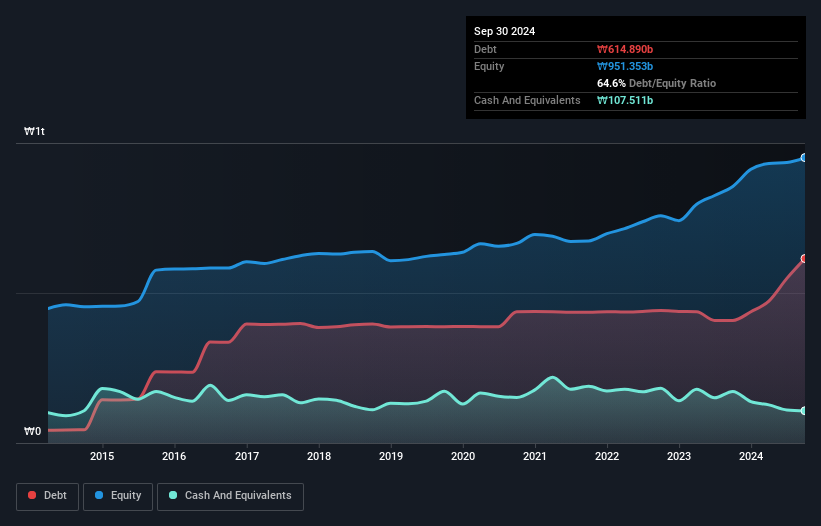- South Korea
- /
- Pharma
- /
- KOSE:A069620
Does Daewoong Pharmaceutical (KRX:069620) Have A Healthy Balance Sheet?

Some say volatility, rather than debt, is the best way to think about risk as an investor, but Warren Buffett famously said that 'Volatility is far from synonymous with risk.' It's only natural to consider a company's balance sheet when you examine how risky it is, since debt is often involved when a business collapses. Importantly, Daewoong Pharmaceutical Co., Ltd (KRX:069620) does carry debt. But is this debt a concern to shareholders?
Why Does Debt Bring Risk?
Debt is a tool to help businesses grow, but if a business is incapable of paying off its lenders, then it exists at their mercy. Ultimately, if the company can't fulfill its legal obligations to repay debt, shareholders could walk away with nothing. While that is not too common, we often do see indebted companies permanently diluting shareholders because lenders force them to raise capital at a distressed price. Of course, debt can be an important tool in businesses, particularly capital heavy businesses. The first step when considering a company's debt levels is to consider its cash and debt together.
Check out our latest analysis for Daewoong Pharmaceutical
How Much Debt Does Daewoong Pharmaceutical Carry?
As you can see below, at the end of September 2024, Daewoong Pharmaceutical had ₩614.9b of debt, up from ₩408.6b a year ago. Click the image for more detail. However, it also had ₩107.5b in cash, and so its net debt is ₩507.4b.

A Look At Daewoong Pharmaceutical's Liabilities
Zooming in on the latest balance sheet data, we can see that Daewoong Pharmaceutical had liabilities of ₩538.1b due within 12 months and liabilities of ₩433.0b due beyond that. Offsetting this, it had ₩107.5b in cash and ₩195.5b in receivables that were due within 12 months. So its liabilities total ₩668.0b more than the combination of its cash and short-term receivables.
Daewoong Pharmaceutical has a market capitalization of ₩1.69t, so it could very likely raise cash to ameliorate its balance sheet, if the need arose. But it's clear that we should definitely closely examine whether it can manage its debt without dilution.
In order to size up a company's debt relative to its earnings, we calculate its net debt divided by its earnings before interest, tax, depreciation, and amortization (EBITDA) and its earnings before interest and tax (EBIT) divided by its interest expense (its interest cover). Thus we consider debt relative to earnings both with and without depreciation and amortization expenses.
Daewoong Pharmaceutical's net debt is 2.8 times its EBITDA, which is a significant but still reasonable amount of leverage. But its EBIT was about 34.5 times its interest expense, implying the company isn't really paying a high cost to maintain that level of debt. Even were the low cost to prove unsustainable, that is a good sign. We note that Daewoong Pharmaceutical grew its EBIT by 28% in the last year, and that should make it easier to pay down debt, going forward. There's no doubt that we learn most about debt from the balance sheet. But it is future earnings, more than anything, that will determine Daewoong Pharmaceutical's ability to maintain a healthy balance sheet going forward. So if you want to see what the professionals think, you might find this free report on analyst profit forecasts to be interesting.
Finally, a company can only pay off debt with cold hard cash, not accounting profits. So we always check how much of that EBIT is translated into free cash flow. Over the last three years, Daewoong Pharmaceutical saw substantial negative free cash flow, in total. While that may be a result of expenditure for growth, it does make the debt far more risky.
Our View
Based on what we've seen Daewoong Pharmaceutical is not finding it easy, given its conversion of EBIT to free cash flow, but the other factors we considered give us cause to be optimistic. In particular, we are dazzled with its interest cover. When we consider all the factors mentioned above, we do feel a bit cautious about Daewoong Pharmaceutical's use of debt. While debt does have its upside in higher potential returns, we think shareholders should definitely consider how debt levels might make the stock more risky. When analysing debt levels, the balance sheet is the obvious place to start. However, not all investment risk resides within the balance sheet - far from it. Case in point: We've spotted 2 warning signs for Daewoong Pharmaceutical you should be aware of.
At the end of the day, it's often better to focus on companies that are free from net debt. You can access our special list of such companies (all with a track record of profit growth). It's free.
New: Manage All Your Stock Portfolios in One Place
We've created the ultimate portfolio companion for stock investors, and it's free.
• Connect an unlimited number of Portfolios and see your total in one currency
• Be alerted to new Warning Signs or Risks via email or mobile
• Track the Fair Value of your stocks
Have feedback on this article? Concerned about the content? Get in touch with us directly. Alternatively, email editorial-team (at) simplywallst.com.
This article by Simply Wall St is general in nature. We provide commentary based on historical data and analyst forecasts only using an unbiased methodology and our articles are not intended to be financial advice. It does not constitute a recommendation to buy or sell any stock, and does not take account of your objectives, or your financial situation. We aim to bring you long-term focused analysis driven by fundamental data. Note that our analysis may not factor in the latest price-sensitive company announcements or qualitative material. Simply Wall St has no position in any stocks mentioned.
About KOSE:A069620
Daewoong Pharmaceutical
Manufactures and sells pharmaceutical products in South Korea and internationally.
Undervalued with proven track record.
Similar Companies
Market Insights
Community Narratives




